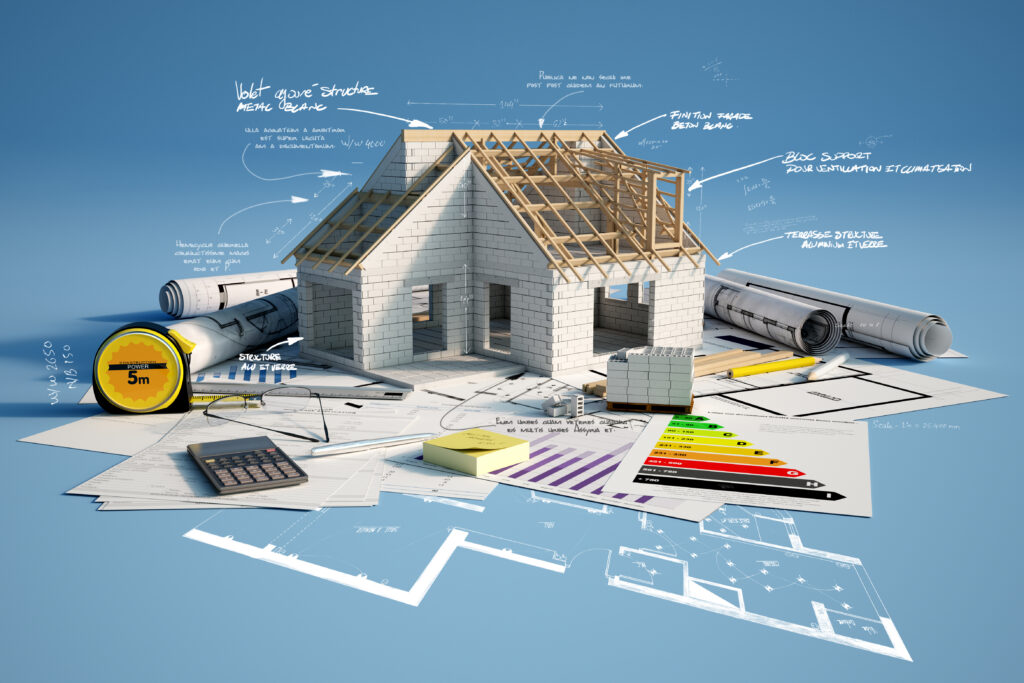By Lizzie Weakley
As the construction industry moves towards a more sustainable future, home owners who are at the helm of creating their custom abodes are presented with a unique opportunity to build a home that not only reflects their personal style but also champions environmental consciousness. Energy efficiency in homes not only contributes to the preservation of the environment but also leads to significant cost savings for home owners.
Building or remodeling a custom home with energy efficiency in mind can sometimes seem like a complex endeavor, but with the right knowledge and approach, it can be a valuable investment that continues to give back in more ways than one. Here's how to ensure your dream home is as energy-efficient as it is luxurious.
Understanding Design and Planning
Before you hammer a single nail or pour a yard of concrete, your custom-built home's journey to energy efficiency begins with thoughtful design and planning. This stage is critical in laying the groundwork for an energy-efficient home.
When working with your architect and home window services, prioritize features like the orientation of the home in relation to the sun's path, the design for optimal natural lighting, and a layout that promotes airflow and the reduction of so-called 'phantom loads.' Phantom loads are energy consumption in your home that occurs even when the devices are turned off – these include televisions, gaming consoles, and other electronics.
Choose a design that minimizes the home's overall ecological footprint, integrates the structure with its surroundings, and utilizes building materials that are both of high quality and feature effective insulation properties. Analyze the efficiency of your floor plan in relation to the activities and functionality of your household.
Integrating energy-efficient features from the ground up, like high-efficiency doors and windows and airtight heating and cooling systems, will contribute to a more comfortable and cost-effective living space.
Choosing the Right Technology and Appliances
The heart of any home's energy consumption lies in its technology and appliances. For your custom-built oasis, make strategic selections that emphasize energy efficiency. Today's market offers a wealth of eco-conscious options for everything from kitchen appliances to heating, ventilation, and air conditioning (HVAC) systems.
Opt for ENERGY STAR-certified equipment and appliances. These products meet strict energy efficiency guidelines set by the U.S. Environmental Protection Agency and the Department of Energy, ensuring that you're investing in technology that is proven to save energy without sacrificing performance.
When it comes to your HVAC system, consider a geothermal heat pump which can offer both heating and cooling, sourced from the consistent, year-round temperature of underground air. In the kitchen, induction cooktops are a prime example of highly efficient cooking technology, as they heat the pan directly using magnetic energy. This process is not only more energy-efficient but also safer and faster than traditional gas or electric elements.
Considering Lighting and Electrical
The lighting and electrical systems in your custom-built home play a pivotal role in its energy consumption. Begin with the principle that natural light is your ally. Consider skylights, light tubes, and strategically placed windows that can dramatically reduce the need for artificial lighting during the day.
When artificial lighting is necessary, opt for LED bulbs, which last longer and use significantly less energy than traditional incandescent or fluorescent bulbs. Smart lighting solutions that allow you to control when lights are on and their intensity can also cut down on waste.
Be judicious with your electrical layout and system design, making sure your wiring is installed correctly to avoid power loss and is capable of handling the energy demands of a modern home. Additionally, the inclusion of an energy management system can provide real-time data on your home's energy use, giving you the knowledge to make informed decisions regarding your consumption patterns.
Installing Insulation and Passive Heating/Cooling
Proper insulation is non-negotiable when it comes to an energy-efficient home. High-quality insulation in the walls, roof, and foundation will help maintain a comfortable temperature within your home year-round, reducing the strain on HVAC systems.
Consider innovative insulation solutions such as spray foam, which offers a higher R-value (a measure of insulation's ability to resist heat flow) than traditional fiberglass or cellulose.
Passive heating and cooling design elements can further reduce your home's energy needs. By incorporating features like shading from trees or external architectural elements, thermal mass materials that absorb and release heat slowly, and passive solar design principles, you can naturally cool and heat your home, reducing the need for mechanical solutions.
Sourcing Renewable Energy
Last but not least, consider the generation of renewable energy on site. Wind and solar power are becoming more accessible and are significant contributors to lowering a home's energy footprint. For a custom-built home, incorporating solar panels into the initial design is much simpler and more cost-effective than adding them to an existing home. Your home's orientation, shading, and even the materials used can be optimized for solar power generation.
In regions where wind power is viable, integrating a small wind turbine into your property can further decrease your reliance on the grid.
Deciding on the generation of renewable energy is an investment in your home's long-term sustainability and can offer the added benefit of potentially lowering or eliminating your ongoing energy costs.
Constructing an energy-efficient custom home is about more than just the structure itself. It's a thoughtful consideration of how the choices you make today impact the environment, your finances, and the future of your household. From the orientation and design to the appliances and insulation, every element of your custom-built home can be optimized to reduce energy consumption and ensure a more sustainable living space. Ultimately, an energy-efficient home is a testament to your commitment to living responsibly and a wise substantial investment that offers returns in comfort, value, and the resilience of the planet.
Lizzie Weakley is a freelance writer from Columbus, Ohio. In her free time, she enjoys the outdoors and walks in the park with her husky, Snowball.








